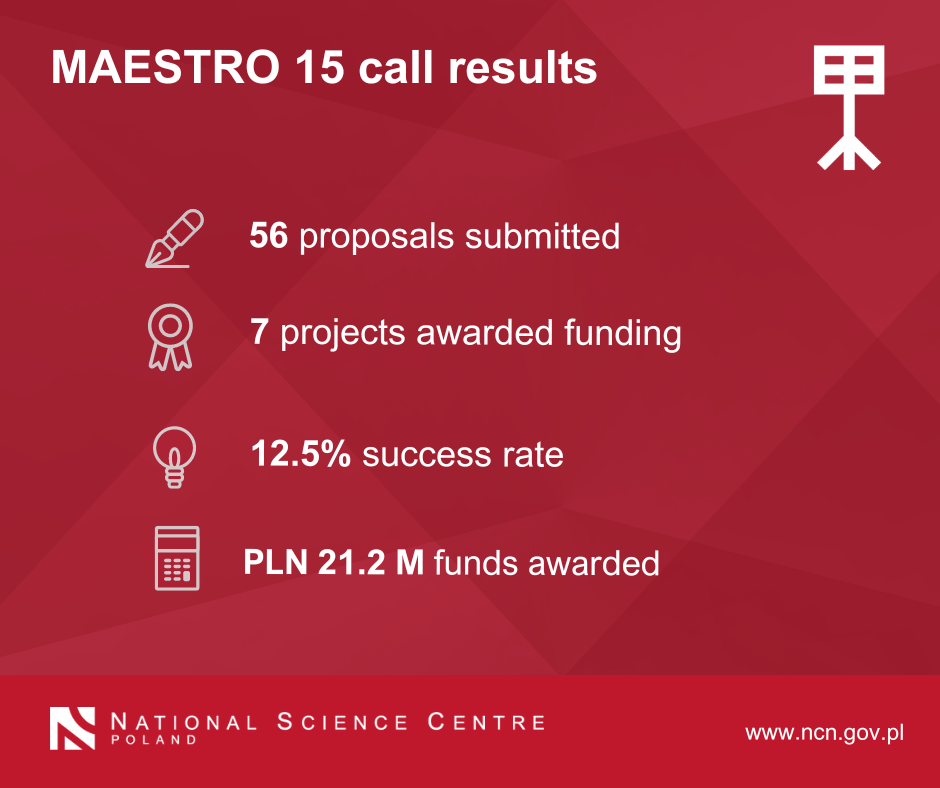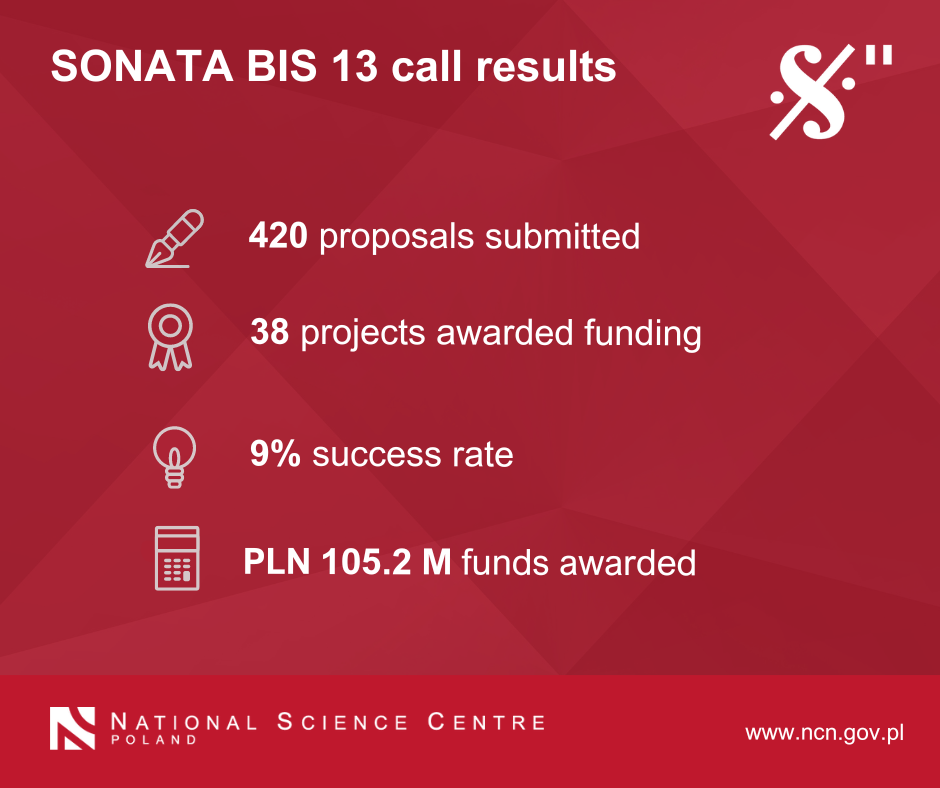7 grants for experienced researchers and 38 grants for new research teams will go to scientists working at Polish host institutions. The NCN will fund their projects with a total of nearly 126.5 million zlotys.
MAESTRO is the most prestigious among the NCN calls organised by the
 National Science Centre. It supports pioneering research projects, often interdisciplinary in nature, which go beyond our current state of knowledge and are likely to bring about important scientific discoveries.
National Science Centre. It supports pioneering research projects, often interdisciplinary in nature, which go beyond our current state of knowledge and are likely to bring about important scientific discoveries.
MAESTRO is targeted at experienced researchers with a PhD degree. Applicants must be able to demonstrate at least five publications released by renowned Polish or international academic publishers/journals in the last 10 years. They are also expected to have served as a principal investigator in at least two research projects selected in international or NCN calls and must meet all other call criteria.
The grant can go toward funding research team salaries, including scholarships for students and PhD students, research equipment costs and other necessary project expenses.
In the 15th MAESTRO call, NCN’s expert teams have selected 7 out 56 submissions. Worth a total of nearly 21.2 million zlotys, the projects will be carried out by host institutions and consortia from six cities: Białystok, Poznań, Katowice, Kraków, Łódź and Warsaw. The success rate of MAESTRO 15 was 12.5%.
MAESTRO 15 ranking list in pdf
In the previous fourteen iterations of MAESTRO, we awarded 278 grants with a total budget of more than 761.5 million zlotys. Project database.
SONATA BIS for early-stage (young) researchers and their ambitious projects
Under SONATA BIS, scientists can apply for funds to set up a new
 research team. It is a unique opportunity for researchers (within 5 to 12 years of earning their PhD) to achieve research independence. Winners will be able to build a team and conduct ambitious innovative basic research projects, with stable funding guaranteed for 36, 48 or 60 months.
research team. It is a unique opportunity for researchers (within 5 to 12 years of earning their PhD) to achieve research independence. Winners will be able to build a team and conduct ambitious innovative basic research projects, with stable funding guaranteed for 36, 48 or 60 months.
The SONATA BIS grant can go toward funding salaries for the PI and other research team members, including scholarships for students and PhD students, research equipment costs and other necessary project expenses.
The list of winners in SONATA BIS 13 features 38 projects from all over Poland, which were selected by expert teams from among 420 proposals, with a total budget of more than 105.2 million zlotys. The success rate was 9.05%.
SONATA BIS ranking list in pdf
In the previous twelve iterations of SONATA BIS, we awarded 881 grants worth more than 1.57 billion zlotys in total. Project database.
Proposal evaluation
Proposals submitted to MAESTRO and SONATA BIS are assessed in a two-stage peer review process. At stage 1, each proposal undergoes a merit-based evaluation by at least two members of the expert team appointed by the NCN for the purposes of the call in question. The reviews are then discussed at the first panel meeting and the team takes a joint decision to pass the proposal on to stage 2 or reject it. At stage 2, each proposal is evaluated by at least two external reviewers and the PI is invited to the NCN for an interview. Based on the results of the interview and the external peer review, the expert team then agrees on the final score for each proposal and selects the projects that will receive funding.
Waiting lists
Just like in calls concluded in November 2023, MAESTRO 15 and SONATA 13 expert teams drew up waiting lists, which include highly rated proposals that experts believe should be funded, but could not receive a positive funding decision because of a lack of resources at the NCN.
These waiting lists could be prepared thanks to a resolution passed by the NCN, which allowed expert teams to take this step. The solution was designed in connection with its efforts to have its funding budget increased; it means that the National Science Centre is now ready to quickly allocate the new resources announced by Minister of Science Dariusz Wieczorek during a press conference on 14 February 2024: 200 million zlotys more for the NCN.
Once the 2024 financial plan has been modified and the National Science Centre has received these additional resources, the NCN Council will pass the relevant resolutions to modify the call budgets.
What does it mean if your project is put on the waiting list?
Researchers who were put on a waiting list receive a negative funding decision, with the caveat that they are now on the waiting list. They are not in any way restricted in the exercise of their rights in the call procedure; they can still appeal against the decision and submit proposals in other calls.
If the budget of the NCN is increased and the NCN Council passes a resolution to commit additional resources to specific calls, waiting list projects will be funded in the order in which they have been ranked by Expert Teams. How many waiting list projects are funded will depend on the sum added to the project by the Council.
The PIs of successful projects will then receive a new funding decision and a relevant announcement will be published on the NCN website.
